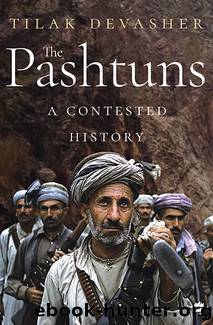The Pashtuns by Tilak Devasher

Author:Tilak Devasher
Language: eng
Format: epub
Tags: null
Publisher: HarperCollins
Published: 2022-09-15T00:00:00+00:00
23
Pakistan and the Taliban 1.0
Afghanistanâs majority ethnic Pashtuns have to be on our side. This is our national interest ⦠The Taliban cannot be alienated by Pakistan. We have a national security interest there.â
âGen Pervez Musharraf1
FOR PAKISTAN, THE RISE OF the Taliban checked many boxes. It perceived Pashtun nationalism, in both Afghanistan and Pakistan, as a major threat to its existence. The Taliban, though Pashtuns, emphasized their Islamic solidarity before ethnicity and so, for Pakistan, were a crucial safeguard against any potential Pashtun ethnonationalism. Then, the Taliban were seen as a better alternative to President Rabbaniâs government in Kabul, which was perceived to being anti-Pakistan and pro-India. The Taliban government fulfilled Pakistanâs long-held desire to have a secure and friendly western border. Pacification of Afghanistan could lead to trade with Central Asia and raised hopes for beginning a gas pipeline project from Turkmenistan to Pakistan via Afghanistan, known as the TAPI gas project.2
Founding Taliban member and later Taliban ambassador to Pakistan Mullah Zaeef makes it clear in his book that the Taliban movement arose indigenously in Kandahar. It was only after their initial successes against warlords in southern Afghanistan that they came to Pakistanâs attention.3 Thus, although Pakistan did not create the Taliban, it acted swiftly to co-opt the movement.
Before the summer of 1994 was over, Carlotta Gall notes, Mullah Omar had acquired Pakistani advisers. âPeople in Kandahar remember a Major Gul, along with Colonel Imam, the Pakistani special forces trainer. Imam was a distinctive figure. He sported a 1942 British paratrooperâs jacket, a long beard and a flat white turban shaped like a car tire, as one Pakistani journalist joked.â âImamâ was the nom de guerre of former Brigadier Amir Sultan Tarar, typical of Pakistani officers who adopted the mujahideen cause as their own. He was known to a large number of mujahideen who he had trained. Omar always addressed the colonel by the honorific title of âustadâ or âteacherâ. He was subsequently appointed as Pakistani consul in Herat and served as a mentor to Mullah Omar and was deeply involved in the Taliban military campaign. According to Carlotta Gall, âThe American reporter Steve LeVine visited the consulate there in June 1996 and found Imam directing the Taliban assault on the Shomali Plain north of Kabul from his desk, barking orders down the telephone.â4
Soon the Taliban were equipped with armour, artillery, even a small air force, as also an impressive communications network and an intelligence system. As Anthony Davis notes: âThe organisational skills and logistical wherewithal required to assemble from scratch, expand, and maintain such an integrated fighting machine during a period of continuous hostilities were simply not to be found in Pakistani madrassas or Afghan villages.â5
Clearly, covert Pakistani support for the Taliban was a key facet of the massive and rapid expansion of the Taliban. The JUI madrassas were not equipped to provide more than ideologically trained cannon fodder for the Taliban movement. According to Carlotta Gall, âPakistani military and intelligence support for the Taliban remained extensive and committed right up to 2001.
Download
This site does not store any files on its server. We only index and link to content provided by other sites. Please contact the content providers to delete copyright contents if any and email us, we'll remove relevant links or contents immediately.
Patriot by Alexei Navalny(373)
2,2-Dimethyl-3,4-dihydro-2H-1,4-benzoxazines as isosteres of 2,2-dimethylchromans acting as inhibitors of insulin release and vascular smooth muscle relaxants by Bernard Pirotte & Xavier Florence & Eric Goffin & Philippe Lebrun(311)
Museum of Antiquity by T. L. (Thomas Louis) Haines(310)
The Story of Joan of Arc by Andrew Lang(297)
The Apollo Moon Missions by Randy Walsh(288)
Richard III and the Princes in the Tower by A.J. Pollard(275)
The Memoirs of Pere Labat, 1693-1705 by Jean Baptiste(261)
Fry The Brain: The Art of Urban Sniping and its Role in Modern Guerrilla Warfare by John West(236)
A History of the Peninsular War, Vol. 5, Oct. 1811-Aug. 31, 1812 by Charles Oman(208)
Life of Napoleon Bonaparte, Volume I. by Walter Scott(208)
The Memoirs of Count Grammont â Complete by Hamilton Anthony Count Walter Scott(206)
1916 - The Battle of the Five Empires: 15 May - 28 September 1916 by Benoît Chenu(198)
Maleficium: Witchcraft and Witch Hunting in the West by Gordon Napier(196)
Rasputin the Rascal Monk by William Le Queux(192)
Famous Fights of Indian Native Regiments by Reginald Hodder(187)
BY MARK Twain, Twain - The innocents at home by 1881(186)
Father Browne's Titanic Album by E. E. O'Donnell(181)
The Thoughts of Marcus Aurelius by Marcus Aurelius(177)
Joanna of Flanders by Julie Sarpy(167)
